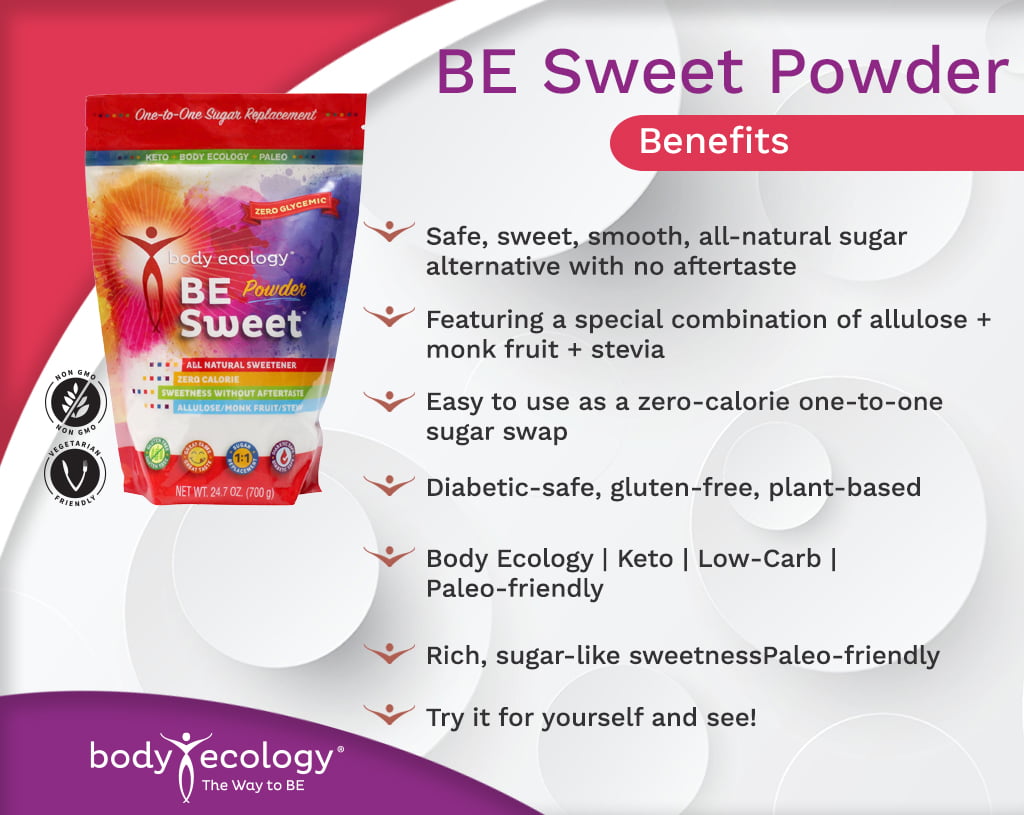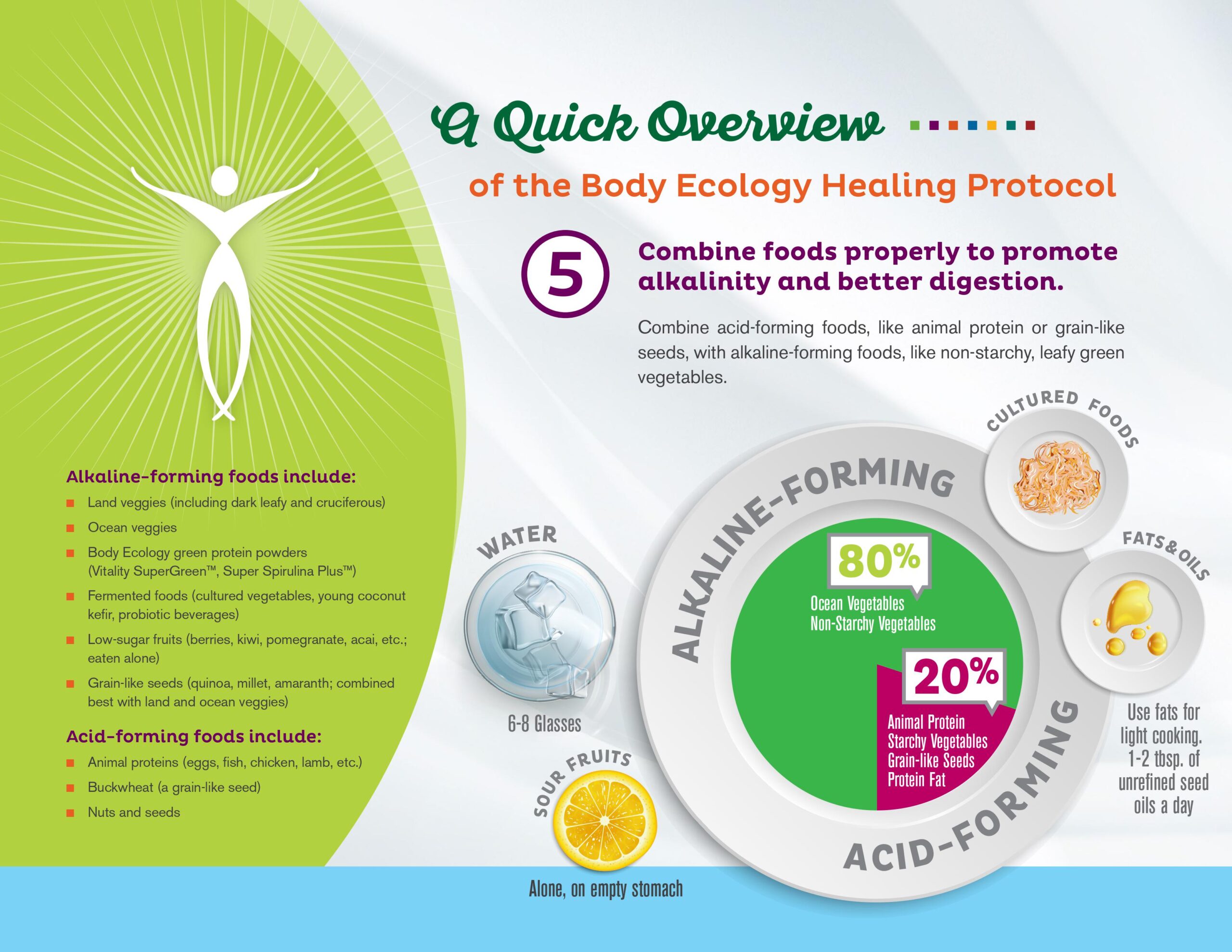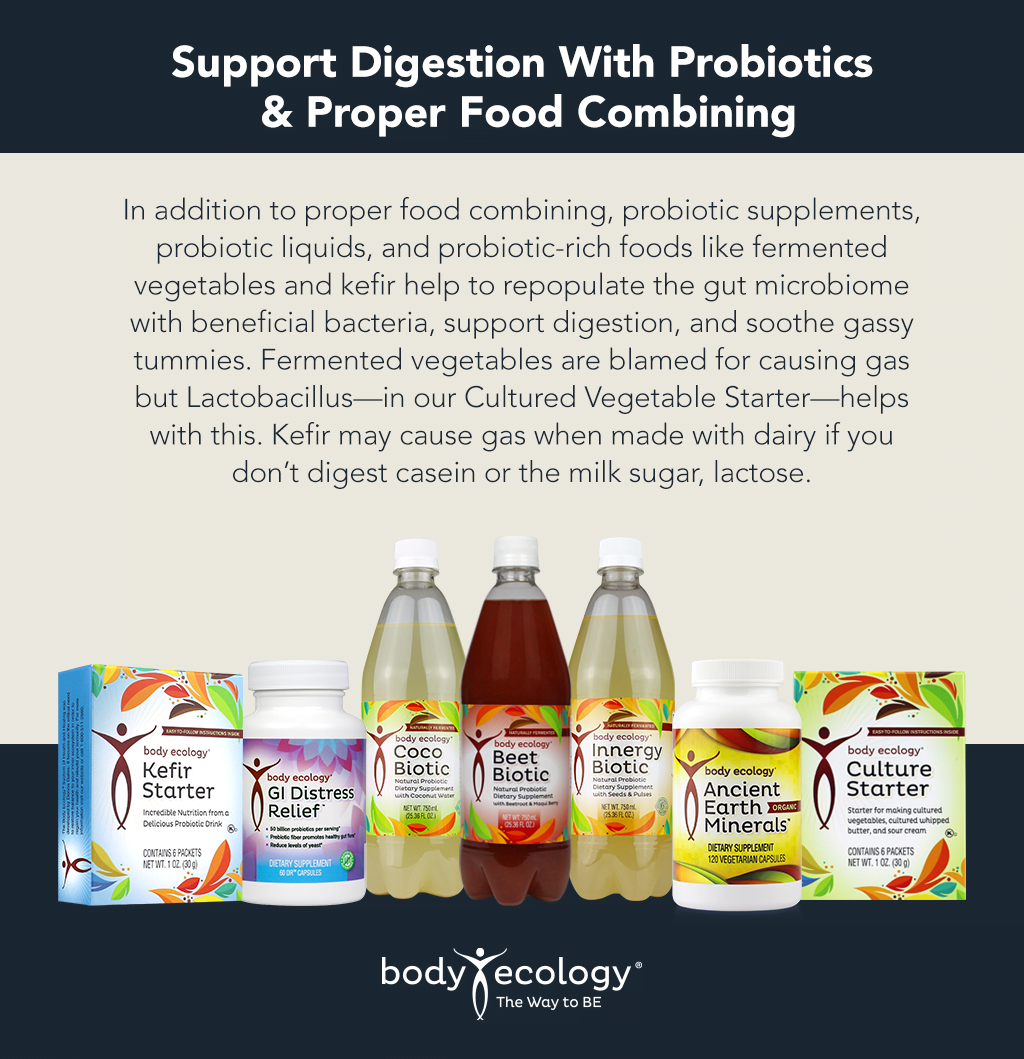Why Am I Gassy? 5 Reasons (and How to Fix Them!)

I’m changing my diet and eating well but am so gassy. What’s happening?
If you’ve found yourself passing gas or are very bloated after a meal — even though you are eating healthy foods — you’re certainly not alone.
There’s probably something that you are unknowingly doing. But more importantly, there are solutions.
#1 – Fermented Foods
Sometimes just changing your diet to “healthy” can be an issue—at least short term. For example, introducing fermented vegetables to your meal when you haven’t ever had them before may cause gas—usually short term.
Introducing beneficial microbes found in Cultured Vegetables can start a “war” with the gram-negative, (unwanted) pathogens in your gut. The good guys need to win over the territory for themselves, colonize and reproduce, and create healthy biofilms and new colonies in the small and large intestine. This battle can cause gas for a short while, but then it will help prevent gas in the long run. Your body just needs some time to adjust.
 Regular sauerkraut and Kimchi may cause gas for many, but cultured vegetables— made the Body Ecology way using Lactobacillus plantarum as a starter—often do not. Fermented beets seem to be fine for many.
Regular sauerkraut and Kimchi may cause gas for many, but cultured vegetables— made the Body Ecology way using Lactobacillus plantarum as a starter—often do not. Fermented beets seem to be fine for many.
#2 – A High-Fiber, High-FODMAP Diet
Eating more fruits, vegetables, grains, nuts and seeds and legumes? These fiber-rich foods could be the reason why your gut has been so upset with you.
Fiber is found in plant foods only. It is a type of carbohydrate that the body cannot digest. As a result, it passes through the body undigested. When the fiber in your food reaches the microbes in your colon, the microbes ferment the fiber and use it for food—causing gas. They also make short chain fatty acids (butyrate, acetate and propionate) from the fiber. These short chain fatty acids (SCFA) are the primary source of nutrition for the cells that line our colon. They are absorbed into our bloodstream where they provide energy and play a key role in reducing type 2 diabetes, heart disease and other inflammatory conditions.
Certain conditions—like IBS—react poorly to fiber since it is too irritating. Watch for gas, bloating, abdominal pain, more frequent bowel movements and even diarrhea.
High FODMAP Foods
Beans are probably always going to cause you gas because they are harder to digest and because they contain a fermentable sugar called GOS (Galactooligosaccharide).
GOS is a FODMAP, which is an acronym that stands for fermentable oligosaccharides, disaccharides, monosaccharides and polyols. These are short chain carbohydrates — not short chain fatty acids — but like SCFAs, they are resistant to digestion. They also reach the colon and are fermented by the gut microbes causing gas and bloating.
You can download the Monash University app on your phone for a list of gas-promoting foods to avoid.
Here is a list of vegetables that Monash University has found that you are less likely to cause you gas and bloating.
Since the gas may be caused by SIBO or SIFO, you’ll want to be addressing those small intestinal overgrowth conditions by taking supplements that reduce bacterial or fungal overgrowth in your small intestine.
- Arugula
- Bamboo shoots
- Bok choy
- Broccoli and Broccolini (the heads, but not the stalks)
- Carrot
- Cassava
- Certain Chili peppers (Poblano, Habanero, Green, Red)
- Chinese cabbage
- Choy sum
- Collard greens
- Cucumber
- Daikon
- Endive
- Fennel leaves (but not the bulb)
- Ginger
- Green beans
- Hearts of Palm
- Jicama
- Kale
- Lettuces
- Parsnips
- Patty pan squash
- Red and green cabbage (but not savoy)
- Spaghetti squash
- Sweet Corn
- Sweet potato and yams
- Tomatillo (but not tomatoes)
- Turnips
- Yellow squash
- Zucchini (maybe)
NOTE: A word of caution: if you are dealing with candidiasis or mold, absolutely avoid the veggies in the list above that are SWEET because they will feed gut infections (like candida, viruses, parasites)
Some of the veggies in this list are high in oxalates. If you are sensitive to oxalates and have a systemic yeast infection, avoid those as well. Yeast and mold create oxalates, too.
What About Onions & Garlic?
Watch out for all onions and their cousins, shallots, leeks and scallions. Scallion tops are fine. As for garlic, it causes gas, but you can use garlic oil when you sauté your foods as a great substitute.
What About Nuts?
Many popular nuts, like almonds and cashews also contain GOS. Flax seeds, pecans, pumpkin seeds and sunflower seeds do not. Even so, nuts and seeds are hard to digest for many of us, and many are high in oxalates.
What About Fruits?
Fruits are often recommended as a source of fiber. However, Monash University has found that many of our favorite fruits cause gas and bloating for those with IBS.
Fruits to avoid include:
- Apples
- Avocado
- Bananas
- Blackberries
- Blueberries
- Cherries
- Cranberries (avoid dried, fresh are fine)
- Currents
- Dates
- Figs
- Goji berries
- Grapefruit
- Green and red grapes
- Nashi
- Peaches
- Pears
- Persimmons
- Plantain
- Plums
- Pomegranate
- Prunes
- Raisins
- Tomatoes
- Watermelon
A few fruits that are OK to eat are:
- Lemon juice
- Lime juice
- Mandarin and navel oranges
- Passionfruit
- Papaya
In order to one day be able to eat healthy fiber rich foods, it’s essential to first heal the IBS. This means, you must:
- Remove inflammatory foods,
- Repair your gut lining and
- Repopulate your gut with beneficial bacteria.
Then you may be able to gradually add some low carb fiber–rich foods back into your meals.
#3 – Sugar Alcohols
Also called polyols, sugar alcohols are carbohydrates (like sugar) that provide about half the calories real sugar serves up, according to the Calorie Control Council. Polyols are one class of FODMAPS.
And no, they do not contain any ethanol (the type of alcohol in your favorite happy-hour drink). Why the “alcohol” in the name, then? It’s simple: Sugar alcohols have chemical characteristics of both sugars and alcohols, according to the FDA.
Sugar alcohols are naturally occurring in trace amounts in certain foods, such as fruits and vegetables (dried pineapple, berries, sweet potatoes and asparagus), according to the U.S. Food and Drug Administration (FDA).
But they’re also commercially produced from sugars and starches; when they appear in a list of ingredients on the back of a packaged food, it means that they’ve been added to the food to boost its sweetness and/or improve its texture or moisture level.
Different types of sugar alcohols include:
- Erythritol***
- Hydrogenated starch hydrolysates
- Isomalt
- Lactitol
- Maltitol
- Mannitol
- Sorbitol
- Xylitol
If you’re reading the ingredients on your diet foods and see plenty of science-y words that end in “ol,” you’re probably looking at a product with sugar alcohols.
Sugar alcohols can be helpful for dieting because they contain fewer calories than plain sugar, but have a similarly sweet taste. Further, many diet foods are marketed as low-sugar or sugar-free because of this ingredient swap.
However, the body can’t actually digest sugar alcohols. This can lead to a seriously upset digestive tract with gas and bloating!
***Erythritol appears to be the one sugar alcohol that does not produce gas.

If you’re struggling to kick your sweet tooth, Body Ecology’s BE Sweet is a safe, sweet, smooth, all-natural sugar alternative with no aftertaste. It’s made with a unique blend of allulose, monk fruit, and stevia, and can be used just like regular table sugar with a 1:1 ratio.
#4 – Carbonated Beverages
Let’s face it: when we’re used to drinking whatever we want, having to drink water can feel downright boring.
So, many dieters will switch things up by drinking flavored sparkling waters to mimic the fizzy effect they gave up with soda. What they may not realize is that, while the switch is likely healthier overall, the gassy side effects can be much worse.
Carbonation is infused through a process of dissolving carbon dioxide, which is the gas we breathe out in exchange for oxygen. Pair that with the bubbles of carbonated beverages, and you have a recipe for trapped gasses that need to come out one way or the other.
Try minimizing your intake of carbonated beverages–or, simply switching carbonated beverages out for water. Water can be infused with lemons, lime and cucumber to make it tasty! Tea is another non-carbonated option that you may enjoy. Tea rarely causes bloating or gas, and it can be wonderfully healthy to boot.
#5 – Raffinose
Still worried about a gassy gut? Raffinose could be the culprit.
Raffinose is a natural sugar found in some varieties of leafy greens. Notable raffinose-rich veggies include brussels sprouts and the stems of broccoli.
Like fiber, raffinose isn’t something you should cut out by any means. It’s known for its ability to positively influence your gut’s microbiome, and that’s something to celebrate!
However, also like fiber, adding too much raffinose into your diet at one meal can lead to major digestive distress.
The best way to treat your gut’s negative reaction to a large addition of raffinose is to gradually add more into your diet–don’t add it all at once! Add new raffinose-rich foods and swap it for existing foods slowly and in small increments over time for the best result. Take a look at the list above to see the leafy greens you can eat: kale, collards, cabbages, (not savoy) arugula, broccolini and broccoli heads (just not the stems).
Support Digestion With Probiotics & Proper Food Combining
The Body Ecology way of living teaches proper food combining — a system of eating foods that combine together efficiently to assist digestion so that your digestive tract does not have to work so hard to give you the nutrients you need for energy. You can learn the basics with three simple guidelines.

In addition to proper food combining, probiotic supplements, probiotic liquids, and probiotic-rich foods like fermented vegetables and kefir help to repopulate the gut microbiome with beneficial bacteria, support digestion, and soothe gassy tummies.
Fermented vegetables are blamed for causing gas, but Lactobacillus—in our Cultured Vegetable Starter—helps reduce gas and bloating. Kefir and yogurt may initially cause gas when made with dairy if you don’t digest casein or the milk sugar, lactose. But the fermenting process greatly reduces the lactose and helps to predigest the casein.
Food combining and fermented foods and liquids are EASY ways to support your health and wellness journey.

The Solution: Take it Slow!
It would be nearly impossible to transition from a diet of pizza and ice cream to a diet of lean meats, fruits, and veggies overnight. Remember the Universal Principle of Step-by-Step. Give yourself some grace, and give your body some time to adjust–all while maximizing your chances for dieting success. Small increments may feel slow, but taking it step by step and not shocking your body will set you up for long-term success.
Main Takeaways and Tips for Less Gas
The bottom line is that you don’t have to live with gas. Experiment and see what can be done to lower it. Being gassy isn’t always a sign that something bad is happening. Not as long as it’s short-term. If you’ve just introduced cultured vegetables into your meals, then a few days of being gassy should subside. Having gas because you’ve added more healthy foods to your diet could also mean the microbes need some time to adjust to these new foods.
Here are 5 more tips:
 Some foods naturally contain fermentable sugars. Look up the FODMAP foods on the Monash University’s app. Avoid all those foods for 3-4 weeks. Then start testing and see which ones you can add back in small quantities without causing gas. This way the microbes in your gut can learn to digest the sugars in them.
Some foods naturally contain fermentable sugars. Look up the FODMAP foods on the Monash University’s app. Avoid all those foods for 3-4 weeks. Then start testing and see which ones you can add back in small quantities without causing gas. This way the microbes in your gut can learn to digest the sugars in them.- Add digestive enzymes to your routine. You may not be digesting animal proteins or the fats in your diet.
- Digestive teas like ginger, fennel and Gas and Bloating Tea From GAIA Herbs are great to push that gas out and not let it blow up inside you.
- Chew your food really well! Chewing slowly also helps avoid swallowing excess air.
- Stay hydrated by drinking water. When you increase your fiber intake, also increase your water intake.
You deserve to feel good, and feel good about your body. This is hard to do when you suffer from a bloated belly. Take a look at these five potential causes of gas and see how you can adjust your diet for a happier, healthy gut.
If your gas is particularly persistent or is causing you pain, though, you should see your doctor. You may have SIBO or SIFO. (Small Intestinal Bacterial Overgrowth or Small Intestinal Fungal Overgrowth.)








